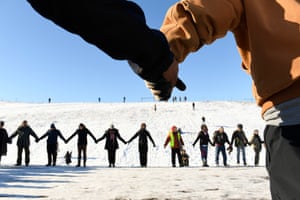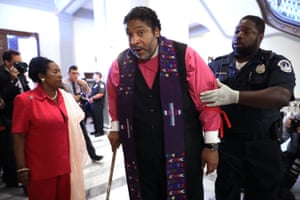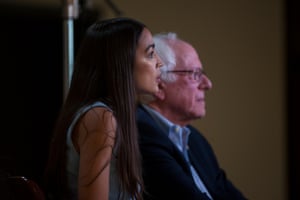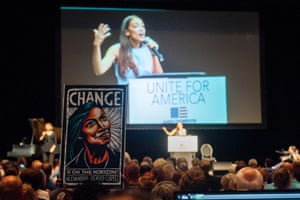How the American left is rediscovering morality
Alexandria Ocasio-Cortez and Bernie Sanders talk to Sarah Smarsh about knowing what’s right from wrong.
After the 2016 presidential election, headlines described a “divided” United States. Alexandria Ocasio-Cortez – at the time a 27-year-old bartender, now a progressive political star running for US Congress after she pulled off a fantastic primary upset in New York last month – sensed an underlying problem that was deeper than politics, more personal than demographic data.
“I just really felt like our country wasn’t understanding itself,” Ocasio-Cortez told me by phone while campaigning for congressional candidate Cori Bush in Missouri. “We didn’t understand each other, and we didn’t understand ourselves as a collective nation.”
It was almost midnight, and her voice sounded strong but tired. Our scheduled interview the previous day, when she visited my home district in Kansas to support another progressive candidate, had been postponed as she navigated her first appearance outside New York. I had figured I wouldn’t get a call at such a late hour and had already changed into my pajamas – an awkward accident that suited the vulnerable questions I intended to ask her about, oh, the meaning of life.
As Ocasio-Cortez pondered her country’s sociopolitical disconnect in late 2016, she told me, she considered her part in it. Having grown up in New York City with strong family ties in Puerto Rico, Ocasio-Cortez had limited experience of the rest of the US – not so different, she said, than growing up in a small town.
That changed in late 2016 when an organizer invited her to join protest camps demonstrating against the Dakota crude oil access pipeline near the Standing Rock Sioux reservation.
Ocasio-Cortez and a friend packed an old Subaru and drove west.

“The cigarette lighter didn’t work, so we couldn’t charge our phones,” she said, recalling plugging in at rest stops as they traversed Pennsylvania, Ohio, Michigan, Indiana, Illinois, Minnesota. They talked with people along the way. Ocasio-Cortez recognized their class struggles, so similar to the ones she saw back in the Bronx.
When they reached Standing Rock, the destination proved to be as formative as the journey. There Ocasio-Cortez witnessed a “profoundly spiritual experience.” Each night in the camps, Indigenous activists entered wigwams to sweat and pray – an ancient ritual for purification and fortification.
“Native American spirituality was the lynchpin for the water protectors there,” Ocasio-Cortez said. “That is where people get the strength.”
Ocasio-Cortez was inspired. The next day, when a progressive political action committee asked her to run for office – the smell of campfire smoke still in her hair, perhaps – she knew the answer was yes.
What is remarkable about this story is not that she felt transformed by an event that was both political and spiritual. It is that she dares to speak of it publicly.
For decades, the two wings of US politics have dealt with spirituality in opposite ways. The God-wielding right proudly trots out organized religion to defend its views, and the secular, postmodern left keeps even non-religious spiritual experiences so quiet as to imply it’s silly or shameful to have them.
That dichotomy has resulted in rightwing dominance of the spiritual space in the US.
It’s been nearly 40 years since Ronald Reagan stepped into the White House with fundamentalist megachurch ringleader Jerry Falwell behind him. On the surface, during that time – the “family values” platform of so many Republicans; influence of Christian televangelist Pat Robertson; Donald Trump’s overwhelming support by Christian evangelicals – it would appear that conservatives owned faith.
But today there is a marked shift in tone on the left – a reconciliation of the public sphere with private meaning, from social-justice-driven religion to non-religious, even atheist, humanism.
Places of worship have become sanctuaries for immigrants at risk of deportation; pro-LGBTQ clergy have stepped forward to combat hate within their denominations; a rogue group of feminist Catholics is ordaining and recognizing women as priests whether the Vatican excommunicates them or not.
An extreme climate is forcing politicians to invoke the concept of right and wrong. To describe government-sanctioned separation of families at the Mexican-American border, for instance, wonky policy language does not suffice.
Liberal leaders from Hillary Clinton to Van Jones to Elizabeth Warren have summoned an old-fashioned word more often associated with the right: this is, they’ve said, a moral crisis.
Like Ocasio-Cortez, I am a pro-choice woman who was raised in the Catholic church. Now happily non-religious, I’m used to holding simultaneous truths that are often painted as contradictory – like, say, revering hard facts while feeling motivated by something deeper than our minds can comprehend.
The Poor People’s Campaign holds that same balance. Begun by Martin Luther King Jr not long before his murder and currently revived by the Rev William Barber of North Carolina and the Rev Liz Theoharis of New York, today the movement mobilizes people of all – or no – faiths across the country to fight inequality.
Leaders draw on scripture alongside statistics to call out the immorality of corporate, government and social structures in the US. Among their fans is Bernie Sanders, who was raised Jewish but isn’t actively involved in organized religion.

Sanders is not one to quote scripture, but he believes ethical imperative is the foundation of serious politics.
“It’s hard to imagine why anyone would be involved in politics if one didn’t have a moral sense of right and wrong, of justice and injustice,” Sanders told me by phone from Washington not long after he visited Kansas with Ocasio-Cortez.
As synchronicity would have it, he had a meeting with the Rev Barber that afternoon. Their rhetoric often sounds the same.
“We are not a just and moral society when three people own more wealth than the bottom half of America. As we speak this moment, you got 40 million people living in poverty. Thirty million people without any health insurance,” Sanders said. “It is racial justice. It is environmental justice. It is issues of war and peace and trying to create a peaceful world, not a world where countries are aiming nuclear missiles at each other.”
Ocasio-Cortez said she’s routinely asked about her avowed democratic socialism, but that political theory is not what drives her.
“A moral imperative is absolutely part of how I approach public policy. Because if it’s not there, then what does?” Ocasio-Cortez said, noting that the tattered books that most shaped her politics were written by moral leaders such as King and Howard Thurman. “Everyone’s going crazy about socialism and democratic socialism. For me, that’s not my seat. My seat is a moral seat.”
She said that we have long sought to be a rich society while failing to discuss the idea of a good society.
“That is why we pay people less than a living wage. That’s why we allow people to be paid starvation wages. That’s why we allow people to go bankrupt in chemotherapy. That’s why we allow people to have their home stripped by a bank that manufactured the crisis in the first place,” Ocasio-Cortez said. “Those are not the markings of a good society.”
Critics call progressive platforms like hers unfeasible, but Ocasio-Cortez isn’t buying it.
“In a society that is materially and logistically and in every way capable of ensuring people are paid a dignified wage, have healthcare, have access to an education and opportunity – if that is materially possible,” she said, “I feel like we are morally compelled to make it so.”
In her 1997 book Healing the Soul of America, re-released in revised form last month, spiritual leader Marianne Williamson described our country’s political dysfunction as symptom of a greedy society that has not yet atoned for its crimes against native and enslaved peoples, exploited laborers, women and children. She called for politicians to work for good rather than for special interests or the status quo: “A conscience-based politics cares less for political expediency than for moral truth.”
Sanders has spent most of his nearly 40 years in public office shunning political expediency, whether as an independent mayor, US representative and US senator in Vermont or as an anti-Wall-Street Democrat riling up the populist left with his 2016 bid for president.

When I asked him whether a moment during his upbringing revealed an ability to stand outside the established order, he recalled seeing boys torment smaller boys on the streets of Brooklyn.
“From an early age, I did not like bullies who were picking on kids who were unable to defend themselves,” he said.
But dealing with political bullies can be a complicated matter. Sanders said that, when forced to weigh political or financial capital with his own ideals, the decision invariably involves compromise.
“I can pick apart every vote that I cast which was a yes vote and tell you that there were things in it that I really, really disliked, without exception,” he said, citing his vote for the Affordable Care Act. “So the judgment there is, ‘Is this what I want? Is this my view of what the American healthcare system should be?’ The answer is no. Will this keep people alive who otherwise might die or become much sicker than they should? The answer is yes. In politics it is never black or white or as clean as you would like it to be.”
When I was a kid in rural Kansas during the Reagan era, the prevailing comment about politicians was, “they’re all crooks.” This assessment sprang from geographic and socioeconomic removal from the formally educated, soft-handed places that decided their fates as farmers, carpenters, cashiers and shelf-stockers.
But incrimination of corrupt leadership should not go so far as to ignore those who try to keep a pure flame burning amid the toxic winds of politics and government.
“To be very honest with you, it is not easy,” Sanders told me. “It’s not easy at all. I would be lying to you if I did not tell you that Washington is a very, very different environment in which to survive with decency. It is a phony environment. It’s an environment where people are very nice to you and then will do everything they can to undermine you. It is an environment where there is an enormous amount of ego. So it is a tough place in which to work, and it takes a toll on me.”
Sanders encouraged budding representatives to “find colleagues who share a common sense of justice and those with you in the fight” and make frequent visits with earnest activists. He had just left a visit with Vermont youth involved in an ACLU immigration effort.
“It strengthens me,” he said. “It makes me feel much more human, talking to these idealistic young kids who are trying to do the right thing.”

While Sanders has surely seen it all behind closed doors in Washington, Ocasio-Cortez acknowledged what she doesn’t know as a first-time candidate.
“I can’t go in with a plan” for staying true, she said. “It’s one thing to say it’s so corrupt and compromised. But you don’t see the small ways in which that is so.”
She might re-read her favorite moral texts, she said, or try to visit her would-be constituents back in the boroughs more often than other representatives do. Running without corporate money set the right foundation for the path ahead, she said. Still, “you just don’t know until you get there. But you walk in with an intention and a commitment.”
She listed US representatives whose integrity inspires her: Keith Ellison of Minnesota, Ro Khanna of California, Pramila Jayapal of Washington, Raúl Grijalva of Arizona. She said she hoped to have the courage of California representative Barbara Lee, who amid 435 representatives cast the lone House vote against the Iraq War in 2001.
“I think they’re holding the candles,” Ocasio-Cortez said. “I hope to just be one more.”
Principled defiance among political leaders does more than affect policy. It inspires people on the ground.
Grassroots activist Davis Hammet, best known for co-founding a rainbow-painted LGBTQ activist center right next to the infamous Westboro Baptist hate group in Topeka, Kansas, grew up in a conservative district in northern Florida.
In early adulthood, he became increasingly alarmed by the Republican Party’s rightward shift on social issues. But when two conservative bills – to force women seeking abortions to have ultrasounds and to attach teacher pay to student performance – crossed Republican governor Charlie Crist’s desk, Crist would not abide. He vetoed both bills and left the Republican party.
“I saw that political courage and I was like, ‘Oh, it’s OK to leave,’” Hammet told me by phone from Topeka. “This is not my values any more.”
So much progress hinges, it seems, on what we are brave enough to say.

Since moving to Kansas to start Equality House, Hammet has conducted anti-bullying campaigns in Kansas high schools and founded the organization Loud Light, aimed at registering young people to vote.
Hammet, who is 28 – the same age as Ocasio-Cortez – originally planned to call his millennial-enfranchising group the Kansas Center for Democratic Participation. But a friend pointed out the distance between the detached language and Hammet’s personal vibe. He dug deeper and came up with the name Loud Light, which he said encourages people to vocalize views built on peace and goodness.
“‘Moral’ has almost this uncomfortable connotation for a lot of people,” said Hammet, a non-religious guy who describes his worldview as “quantum oneness.” “But you say ‘loud light,’ and I think people get it. They’re like, ‘Yeah, being outspoken about the good stuff.’”
In recent decades, according to Pew Research Center, the portion of Americans who claim no religious affiliation has risen from one in 10 to nearly one in four. Meanwhile, Pew found in a 2014 survey of 35,000 people that just 18% of those “nones” identify as politically conservative.
It makes sense, then, that – in a culture whose framework for morality has relied on religion for centuries – many liberals would struggle to find the words to talk about what moves them at the deepest level.
Virtue is a murky, subjective realm. Perceived righteousness in the wrong hands has led to countless wars and tragedies. For me, a good guide is this: Any set of “values” that draws lines between or hierarchies among people is bogus.
The burgeoning movement for social justice among the religious left, the spiritual nonreligious, agnostics and atheists seems, to me, legit for the way it brings people together rather than divides them.
New Jersey senator Cory Booker recently reflected on the concept of unity for an episode of On Being, the seminal public radio show that examines life’s deepest questions. He said one of his favorite books, the 1960s sociocultural analysis The Fire This Time, by James Baldwin, outlines horrifying truths but ends with two hopeful pages about coming together.
“Here is Baldwin, who just talked about these fissures in our society, that ends this book by calling to blacks and whites to be ‘like lovers,’ he writes, and to insist upon and create a new consciousness that he goes: Human history is, and negro-American history is, in particular, a perpetual testimony to the achievement of the impossible,’” Booker told On Being host Krista Tippett. “And this is what I operate on, every single day. I am the physical manifestation of these individual choices that were made, by so many people, to choose light over darkness.”
Booker, who told Tippett he had been advised to sound “tougher,” said he now unapologetically lets his love flag fly whether it’s good political strategy or not. Last May, he and Massachusetts senator Warren – both thought to be contenders for the Democratic presidential ticket in 2020 – were the rare politicians to deliver activist sermons from a pulpit at a large conference of pastors and seminary students in Washington DC.
The most frequent discussion he had touring for his 2016 book United: Thoughts on Finding Common Ground and Advancing the Common Good was with people seeking “a sense of connection to other Americans that transcends the things that seem to be dividing us, a sense of yearning in this country for an understanding that we’re all in this together.”

Sanders and Ocasio-Cortez carried a message of unity when they took their democratic socialist message to Republican stronghold Kansas in support of local progressive campaigns. Their rallies in Wichita and Kansas City drew thousands, and they reiterated the sameness of Kansas people and their communities back east.
“I understand that there are differences between the people in Vermont and the people in Kansas,” Sanders told me. “But the truth is that in virtually every area of human concern, the commonality, the common interests, of the people in the two states far, far outweighs whatever regional differences there may be.”
Hammet pointed out that even rural areas – on maps, the conservative red area of the much-touted “rural-urban divide” – contain seeds of understanding that might lead more people there to join a progressive movement about togetherness.
“Small towns recognize that they need each other,” Hammet said, citing the community ritual of a barn raising. “One family cannot raise a barn. Everyone comes together and helps each other, and there’s a social capital there. It’s not even inherently expressed. Everyone knows, ‘you’re helping me and I’m gonna help you, because we can’t do this without each other.’”
Many white rural voters have been written off by the left as a lost cause. But Hammet learned not to simplistically cast others as villains when, through his work with Equality House, he lived next to the homophobic Westboro Baptist group.
“You have these people that are monsters of the world, and they’re my neighbors who I see laughing with their kids at the park,” said Hammet, who identifies as queer. “You’re forced to be like, ‘All right, how can I accept that these are normal people that have an extreme view?’ Dangerous and problematic but also human.”
Hammet said that facing social woes means looking in the mirror.
“Everyone wants to condemn Westboro Baptist church, but they don’t want to admit and confront their own prejudice,” he said. “It’s really too easy to be like, ‘look, they’re homophobic, look, they’re racist,’ but it’s a lot harder to be like, wait I have a little bit of racism in me. I have a little bit of homophobia in me.” For him, facing social woes means looking in the mirror.
Anyone who labors today for social progress has no assurance it will come to pass tomorrow – and if it does it may not be in their lifetimes. This is a conviction that requires motivation beyond logic. This is a civic faith.
During Ocasio-Cortez’s recent speech in Kansas in support of candidate James Thompson’s effort to flip that congressional district blue for the first time in 26 years, she encouraged the crowd of underdogs – progressives in a “deep red” place – to commit to changing political outcomes by tirelessly knocking on doors even as pundits and naysayers say they’re wasting their time.
That’s how she beat the odds in her primary race, a street hustle that wore holes in her shoes as she spoke to voters face to face.
“That conversation can never be un-had,” she told the crowd. “Those doors can never be un-knocked. And the power will never go away.”
This reminded me of a line from the bestselling spiritual tome A Course in Miracles, which defines “miracle” not as a favor granted by a bearded deity but as the correction of a misperception – specifically, the shift from fear to love: “A miracle is never lost. It may touch many people you have not even met, and produce undreamed of changes in situations of which you are not even aware.”
One change that has been dreamed of, among this progressive set, is a “blue wave” of liberals winning races across the country in the fall midterm elections. Whether that comes to pass, Hammet said the civic engagement that so many previously apathetic Americans are awakening to – participating in “deciding what tomorrow looks like” – is an energizing force with many benefits.
“I’ve had so many of my friends commit suicide. One thing I always felt is, they feel powerless to change anything. So I view civics as a health crisis,” he said. “We have to make people feel that power and live that power. The revolution is there. If people vote, it is a completely different world.”
No one knows that better than Sanders, who in 1981 won the race for mayor of Burlington, Vermont, by 10 votes. He likened that victory to Ocasio-Cortez’s unlikely win.
“She was a 100-to-one underdog,” Sanders said. “Turns out that the opposition was not quite as strong as people thought it would be. We’re seeing that all over the country. Sometimes when you do the right thing – and you organize at the grassroots level and you have ideas which resonate with people – you can do remarkable things.”







Follow Us!